法语现在分词和动名词
动名词与现在分词的区别
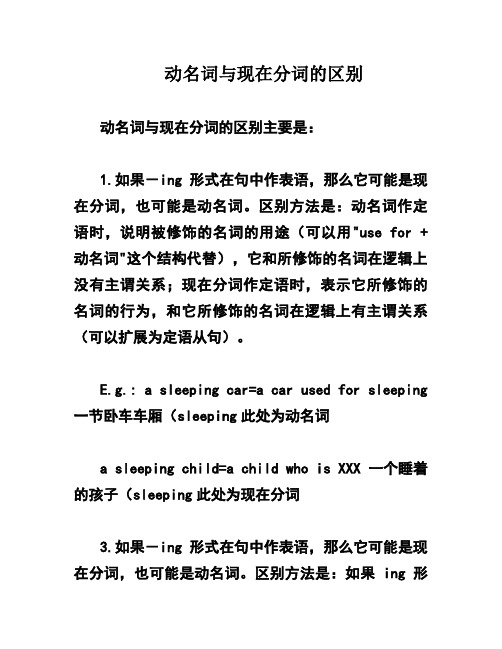
动名词与现在分词的区别动名词与现在分词的区别主要是:1.如果-ing形式在句中作表语,那么它可能是现在分词,也可能是动名词。
区别方法是:动名词作定语时,说明被修饰的名词的用途(可以用"use for +动名词"这个结构代替),它和所修饰的名词在逻辑上没有主谓关系;现在分词作定语时,表示它所修饰的名词的行为,和它所修饰的名词在逻辑上有主谓关系(可以扩展为定语从句)。
E.g.: a sleeping car=a car used for sleeping 一节卧车车厢(sleeping此处为动名词a sleeping child=a child who is XXX一个睡着的孩子(sleeping此处为现在分词3.如果-ing形式在句中作表语,那么它可能是现在分词,也可能是动名词。
区别方法是:如果ing形式相当于一个名词,可以与主语交换位置,它就是动名词。
如果-ing形式相当于形容词,不能与主语交换位置,它就是现在分词。
4. “动名词+名词”和“现在分词+名词”的读音不同,前者的重音在“动名词”上(a ‘sleeping suit),而后者的重音在“名词”上(a sleeping ‘chi ld)。
5.动名词用法的特殊情形①No+动名词——用于简短的禁令或禁律 E.g.: No smoking.②There is no+-ing(…是不可能的)= It is impossible to ~ = No one can ~(or We cannot ~)E.g.: There is no XXX when lasting XXX will come. (谁也不知道永久的和平何时到来)③Never (or not) … without+ -ing(每次…都…)= wheneverE.g.: He never XXX.④It goes without saying that(…是不用说的)= It is XXXE.g.: It goes without saying that no animal can live without breathing.⑤Do+动名词(做需要若干时间或一再重复的事情)——动名词之前都由the、所有格或some/alittle/ much/ a lot of之类的形容词。
动名词与现在分词的区别
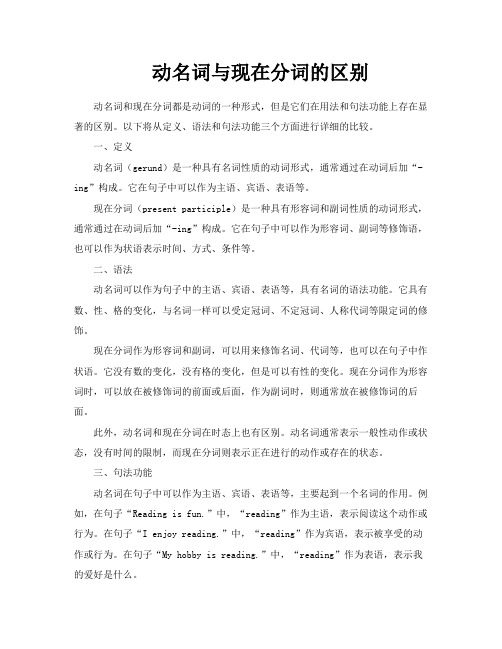
动名词与现在分词的区别动名词和现在分词都是动词的一种形式,但是它们在用法和句法功能上存在显著的区别。
以下将从定义、语法和句法功能三个方面进行详细的比较。
一、定义动名词(gerund)是一种具有名词性质的动词形式,通常通过在动词后加“-ing”构成。
它在句子中可以作为主语、宾语、表语等。
现在分词(present participle)是一种具有形容词和副词性质的动词形式,通常通过在动词后加“-ing”构成。
它在句子中可以作为形容词、副词等修饰语,也可以作为状语表示时间、方式、条件等。
二、语法动名词可以作为句子中的主语、宾语、表语等,具有名词的语法功能。
它具有数、性、格的变化,与名词一样可以受定冠词、不定冠词、人称代词等限定词的修饰。
现在分词作为形容词和副词,可以用来修饰名词、代词等,也可以在句子中作状语。
它没有数的变化,没有格的变化,但是可以有性的变化。
现在分词作为形容词时,可以放在被修饰词的前面或后面,作为副词时,则通常放在被修饰词的后面。
此外,动名词和现在分词在时态上也有区别。
动名词通常表示一般性动作或状态,没有时间的限制,而现在分词则表示正在进行的动作或存在的状态。
三、句法功能动名词在句子中可以作为主语、宾语、表语等,主要起到一个名词的作用。
例如,在句子“Reading is fun.”中,“reading”作为主语,表示阅读这个动作或行为。
在句子“I enjoy reading.”中,“reading”作为宾语,表示被享受的动作或行为。
在句子“My hobby is reading.”中,“reading”作为表语,表示我的爱好是什么。
现在分词在句子中主要作为形容词、副词等修饰语,起到一个修饰、描述或说明的作用。
例如,在句子“The dog is running after the ball.”中,“running”作为现在分词作形容词,描述了“dog”的状态。
在句子“While I was reading, she came in.”中,“reading”作为现在分词作状语,表示我正在进行的动作。
动名词(gerund)和现在分词(present-participle)的区别

动名词(gerund)和现在分词(present participle)的区别所谓动名词(gerund)就是名词,只是保有一些动词的功能。
所以它在句中可以作主语,宾语,表语,同位语,定语等那些名词可以充当的成分.而现在分词(present participle)相当于形容词,在句中作定语或者状语所以当—ing形式出现在句中作主语,宾语,同位语时,它肯定时gerund.当-ing形式出现在句中作状语时,它肯定是present participle.它们有可能被弄错的是作表语和定语时.其实也很好区分1. 作表语: 我们知道, 名词和形容词都可以作表语。
This is water(n。
).It is transparent(adj).这时你肯定能明白,如果—ing作表语相当于n.它就是gerund. 反之相当于adj.时它就是present。
participle。
The situation both at home and abroad is very inspiring。
One of the best exercises is swimming.2. 作定语时的区别我在回答中已经解释了. 动名词作定语时,表示它所修饰的名词的性能和用途,和它所修饰的名词在逻辑上没有主谓关系;现在分词作定语时,表示它所修饰的名词正在进行的动作,和它所修饰的名词在逻辑上有主谓关系。
a sleeping bag。
(用途)=a bag for sleepinga sleeping child = a child is sleeping (child是sleep的主语,sleep是child 发出的动作)(呵呵下面再请你告诉我它们分别是什么吧!a swimming girla swimming pool3. 最后来解释修饰他们到底该用是adv, 还是adj.无论是Present participle。
还是gerund, 它们都叫做动词的-ing形式(所以若有人分不清它们时,多把它们混为一谈).也就是说它们都有动词的特点,故而都可用adv修饰。
法语现在分词
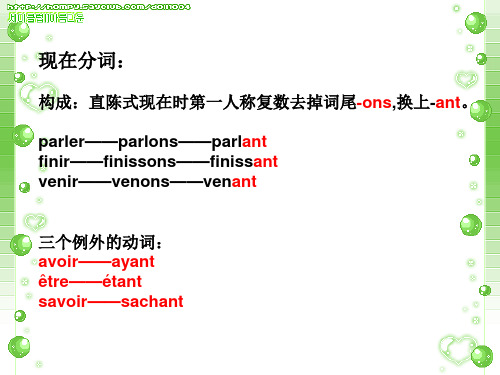
ici.
4.没有自己的时间意义, 取决于主句动词的时间意义
5. 通常置于主句前
用法:
1. 定语,相当于qui引导的关系从句(形容词性从句)。 Il y avait beaucoup de jeunes bavardant au café.
Paul voit Isabelle (en)sortant de la boujouterie. 5. 现在分语可以有否定形式,副动词一般无,但副动词前 可以有tout。 6. 位置 7.现在分词用于书面语,副动词书面语和口语都使用。
4. 构成独立分词从句
注意: 现在分词和动形容词的区别
副动词
构成:en + 动词的现在分词形式:
en parlant en finissant en se promenant
avoir, être 不用副动词形式
特征: 1. 兼有动词和副词的功能
2. 作为动词, 可以带有宾语和状语
3. 作为副词, 修饰主句的谓语, 起状语的作用
5. 表示让步,对立
En protestant de sa fidélité, il nous a trahis.
现在分词和副动词的异同
同: 无人称和性数变化, 都表示主动, 都从动词转变过来,都具有 状语从句的功能
不同: 1. 现在分词还可修饰名词代词,有定语从句的功能,而副动 词只用来修饰动词,只有状语从句的功能
现在分词:
构成:直陈式现在时第一人称复数去掉词尾-ons,换上-ant。
parler——parlons——parlant finir——finissons——finissant venir——venons——venant
现在分词作表语与动名词作表语的区别
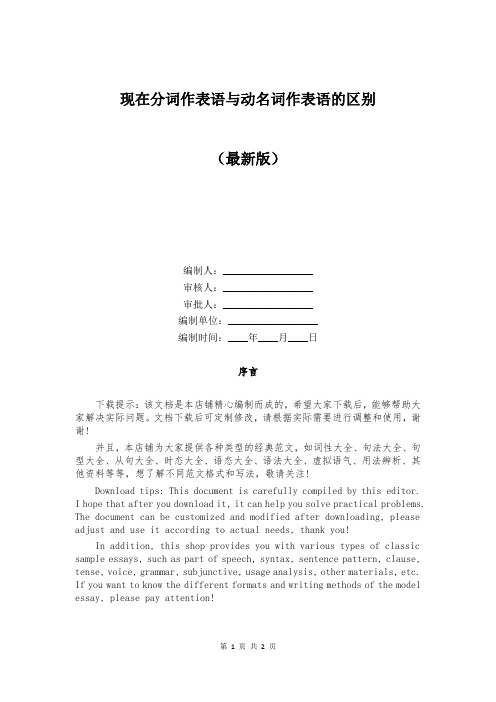
现在分词作表语与动名词作表语的区别(最新版)编制人:__________________审核人:__________________审批人:__________________编制单位:__________________编制时间:____年____月____日序言下载提示:该文档是本店铺精心编制而成的,希望大家下载后,能够帮助大家解决实际问题。
文档下载后可定制修改,请根据实际需要进行调整和使用,谢谢!并且,本店铺为大家提供各种类型的经典范文,如词性大全、句法大全、句型大全、从句大全、时态大全、语态大全、语法大全、虚拟语气、用法辨析、其他资料等等,想了解不同范文格式和写法,敬请关注!Download tips: This document is carefully compiled by this editor.I hope that after you download it, it can help you solve practical problems. The document can be customized and modified after downloading, please adjust and use it according to actual needs, thank you!In addition, this shop provides you with various types of classic sample essays, such as part of speech, syntax, sentence pattern, clause, tense, voice, grammar, subjunctive, usage analysis, other materials, etc. If you want to know the different formats and writing methods of the model essay, please pay attention!现在分词作表语与动名词作表语的区别用作表语的分词通常具有形容词性质,有的甚至已转化为形容词。
法语学习笔记之现在分词副动词
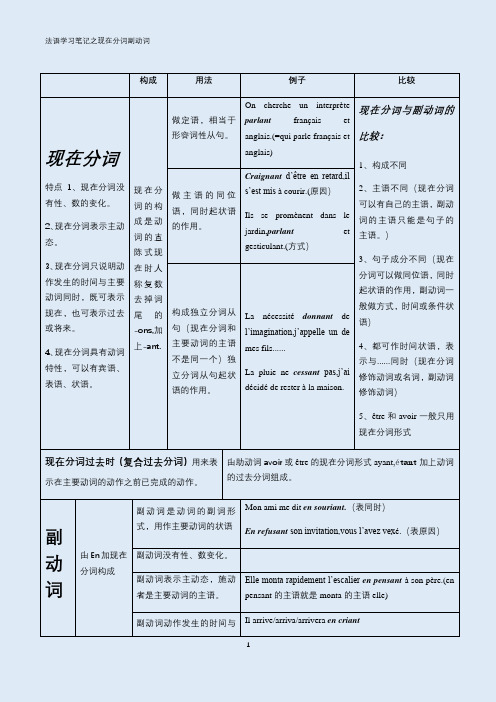
Ayant bien réussi dans ses études en France,il rentre plein d’espoir en Chine.
用 作定语
Mme Sullerot s’adressa à la postière assise derrière le
2
法语学习笔记之现在分词副动词
4、都可作时间状语,表 示与......同时(现在分词 修饰动词或名词,副动词 修饰动词)
5、être 和 avoir 一般只用 现在分词形式
现在分词过去时(复合过去分词)用来表 由助动词 avoir 或 être 的现在分词形式 ayant,étant 加上动词
示在主要动词的动作之前已完成的动作。
副动词表示主动态,施动 Elle monta rapidement l’escalier en pensant àson père.(en
者是主要动词的主语。 pensant 的主语就是 monta 的主语 elle)
副动词动作发生的时间与 Il arrive/arriva/arrivera en criant
过去分词可带有状 语、施动者补语等
L’ennemi,atteint d’une balle,s’affaissa.(施动者补语)
Les camarades de Jean Coquelin,venus en masse,attendaient......(状语)
Remarque
以 avoir 为助动词的不及物 动词,其过去分词不能单 独使用
3、现在分词只说明动 作发生的时间与主要 动词同时,既可表示 现在,也可表示过去 或将来。
4、现在分词具有动词 特性,可以有宾语、 表语、状语。
现在分 词的构 成是动 词的直 陈式现 在时人 称复数 去掉词 尾的 -ons, 加 上-ant.
V-ing-详解
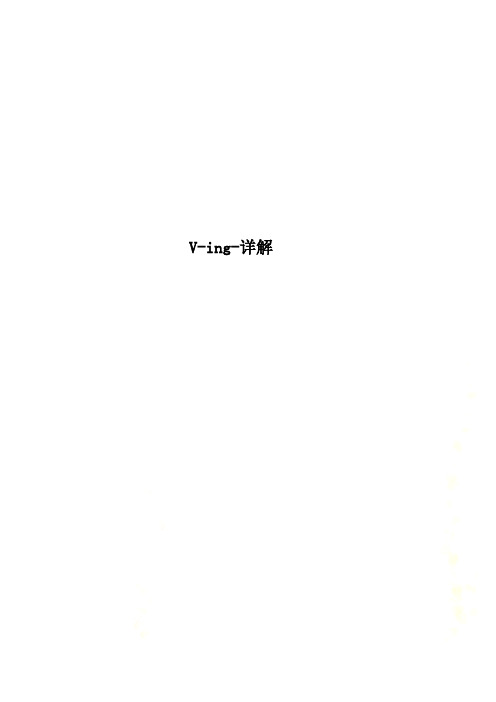
V-ing-详解Women can hold up half of the sky第2页/共29页必修四 Unit 2---Unit 4 语法详解 动名词和现在分词用法解析 一、V-ing 形式概念(1) V-ing 形式包括两种:①动名词:具有名词特征,在句子中可作主语,宾语,表语,定语等。
② 现在分词: 具有形容词和副词特征,在句子中可作定语、状语、表语、宾补Speaking in the public , he will surely be very cheerful .(现在分词短语,作状语)他在公众场所讲话时总是兴高采烈的。
She hates speaking in the public. (动名词短语,作宾语) 她不喜欢在公众场所讲话。
Feeling the lesson boring, the students are sleepy. There are many sleeping students in class.Seeing is believing.I suggest going shopping tomorrow.The lesson is boring.(2) 动词ing 时态及否定形式① V-ing 一般式表示这个动作正在进行或与谓语表示的动作同时发生.Eg: They went out of the classroom, talking andlaughing Array The largebuildingbeing built isa library.② Ving完成式: 强调这个的动作在谓语动词所表示的动作之前完成Eg: Having lived in this city for three years, sheknows it very well.第3页/共29页Eg: Having been shown the lab, we were taken to see the library.动词ing的否定形式在ing的前面加not 或never 的否定副词Not knowing how to find the subway, I asked a policeman for help.Never have been to Beijjing before, she felt at a loss where to go.二、动名词详解(1)动名词作主语Reading French is easier than speaking it. 阅读法文比讲法语容易。
V-ing 详解

必修四 Unit 2---Unit 4 语法详解动名词和现在分词用法解析一、V-ing 形式概念<1> V-ing 形式包括两种:①动名词:具有名词特征,在句子中可作主语,宾语,表语,定语等.②现在分词: 具有形容词和副词特征,在句子中可作定语、状语、表语、宾补Speaking in the public , he will surely be very cheerful .〔现在分词短语,作状语〕他在公众场所讲话时总是兴高采烈的.She hates speaking in the public. 〔动名词短语,作宾语〕她不喜欢在公众场所讲话.Feeling the lesson boring, the students are sleepy.There are many sleeping students in class.Seeing is believing.I suggest going shopping tomorrow.The lesson is boring.<2> 动词ing时态与否认形式①V-ing 一般式表示这个动作正在进展或与谓语表示的动作同时发生.Eg: They went out of the classroom, talking and laughingThe large building Array being built is alibrary.② Ving完成式:强调这个的动作在谓语动词所表示的动作之前完成Eg: Having lived in this city for three years, she knows it very well.Eg: Having been shown the lab, we were taken to see the library.③动词ing的否认形式在ing的前面加not 或never的否认副词Not knowing how to find the subway, I asked a policeman for help.Never have been to Beijjing before, she felt at a loss where to go.二、动名词详解〔1〕动名词作主语Reading French is easier than speaking it. 阅读法文比讲法语容易.Talking to him is talking to a wall. 和他说话等于对牛弹琴.注意:1. 动名词作主语,有时用it作形式主语,把动名词主语放在句子后面It's nice seeing you again. 再次见到你太好了.It was tiring driving from morning till night. 从早到晚开车很累人.用it作形式主语,动名词短语位于之后,常用于一些固定句型中,如:It +be +a waste of time doing 做……是浪费时间的It is no good/use doing 做……是没用处的It ishardly/scarcely worth doing 做……不值得It is worth/worthwhile doing 做……是值得的注意区别:在It’s important … / It’s necessary … / It’s advisable …这类句型中,只能用不定式,如:It’s important to learn foreign languages.It’s quite necessary to read it many times.2."There is + no〞后可以用动名词作主语There was no knowing what he could do. 他能做什么很难说.There was no arguing with her. 没法和她争论.常见的固定句型如下:There is no doing 无法……There is no sense in doing 做……没有道理There is no use doing 干……无意义There is nothing worse than doing 没有比……更糟的There is no point doing 干……无意义注意:There is no need to do sth 没必要做...没有必要告诉她.__________________________________3. 动名词作主语与不定式作主语的区别:动名词表示的动作通常是一个泛指的动作,不定式如此通常表示具体的动作.As a child,she felt that _________________ was a duty and a pleasure.还是个孩子的时侯,她就觉得探视病人是一种责任,也是一种愉悦.____________ in an American home will be a good experience for me.到美国人家里做客对我来说将是一个极好的经历.(2)动名词作宾语动名词作宾语有两种情况.一是动词后接动名词作宾语,二是介词后接动名词作宾语①只能接动名词作宾语的动词,常见的有avoid,consider,enjoy,keep,finish,suggest,dislike,escape,cannothelp,imagine,mind,miss,cannot stand等.如:1>我不能不去.I can’t avoid going.2>你是否考虑过找一位挚友? Have you considered __________ one special friend3>我们必须设法防止犯<mit>同样的错误. We must try to _____________ the same mistake.4>人们忍不住嘲笑那个愚蠢的人.People _________________________ foolish man.②既可接动名词又可接不定式作宾语的动词,常见的有:begin,start,continue,like,love,prefer,by,mean,forget,remember,hate等.注意:1. 在like,love,hate,prefer等动词之后,用-ing或不定式意义上没有什么不同,只是侧重点有些不同,动名词表示泛指的动作,不定式表示具体的一次性动作.2. 在动词forget,remember,regret之后,用动名词与不定式意义不同.如:remember to do 记得去做 remember doing 记得做过I’ll remember to post the letter.我会记着去寄信的.I remember posting the letter.我记得我已把信寄了.forget to do 忘了去做 forget doing 忘了做过Don’t forget to write to your mother.__________________________________________I shall never forget seeing the famous writer.________________________________try to do <设法做>try doing <试试做>1>我们必须设法与时把一切搞好. We must try to get everything done in time.2>我们用别的方法做这工作试试.Let’s try doing the working in some other way.mean to do 打算做,有意要做mean doing <意味着做>I didn’t mean to make you angry.______________________________In Beijing, missing a bus means waiting for another hour. ______________________________ go on to do <接着做另一件事> go on doing继续做一直在做的事1> 请接着做这同一个练习.______ the same exercise.2> 请做另外一个练习.________________ the other exercise.stop to do <停下正在干的事去干另一件事> stop doing<停止做>我们停止了交谈.________________________________我们停了下来去谈话.___________________3. 在表需要类动词,如need, want, require, 可用动名词主动形式表被动形式Your hair wants cutting. 你的头发该理了.〔= want to be cut〕The floor requires washing. 地板需要冲洗.〔= requires to be washed〕My house needs painting. 我的房子需要油漆一下. 〔=need to be painted〕作介词宾语.I insist on taking proper food fort his expedition.我坚持为这次出行带足需要的食物. We’ve got to think of ways of changing people’s habits. 我们得想些法子改变人们的习惯.我向你道歉,刚刚对你那样生气.I apologize __________________ so angry with you.离开几年之后再回到你生长的地方,感觉有点怪.__________ away for several years,it is a strange experience to return to the place you were born and brought up.(3)动名词作表语Her hobby is painting. 她的爱好是绘画.Her job was tending the sheep. 她的工作是放羊.〔4〕动名词作定语动名词作定语,表示其所修饰名词的性质,或用途或功能,如:building materials = materials for building 建筑材料a walking stick = a stick for walking 手杖a reading room = a room for reading 阅览室a writing desk = a desk for writing 写字台三、现在分词详解(1)现在分词作定语现在分词作定语表示其所修饰的名词的动作,即: 现在分词与其所修饰的名词在逻辑上具有主谓关系.通常能改为一个定语从句.如:developing countries 开展中国家a falling star 流星主要报纸 a running manThe man running inthe picture is Liu Xiang.= The man who is runningin the picture is Liu Xiang.注意:1. 单个现在分词作定语修饰名词一般置于名词之前,现在分词词组修饰名词如此置于名词之后此时相当于一个定语从句2. 动名词和现在分词都可以用作定语来修饰名词,两者的区别在于: 动名词修饰名词时主要表示该名词的用途,而现在分词修饰名词时性质、状态或动作等。试比拟:①a swimming boy"一个正在游泳的男孩〞,即a boy who is swimminga swimming suit "游泳衣〞,即a suit for swimming②a sleeping child "一个正在睡觉的孩子〞,即a child who is sleepinga sleeping car "卧车<被用来睡觉的车厢>〞,即 a car which is used for sleeping(2)现在分词作表语现在分词作表语通常表示主语的属性和特征,相当于形容词,含有"令人...",其主语通常是物.The news is encouraging. 这消息令人鼓舞.This story is very interesting. 这个故事很有趣.Your journey in Kenya is really exciting.What you did was disappointing.The nightmare I had last night was very frightening.注意:动名词和现在分词都可以用于系动词之后作表语,区别方法是:①作表语的动名词与主语指的是同一件事,此时系动词相当于"是〞,通常把主语和表语的位置互换,语法和意思不变,例如: My hobby is swimming.可改为Swimming is my hobby.<可将原句中的主语与表语位置互换>②现在分词作表语主要用以说明主语的性质,不能与主语互换位置,例如: The story is interesting .不可改为:Interesting is the story.〔3〕现在分词作状语.现在分词与其短语可以用作状语,表示时间、原因、结果、条件、让步、方式或伴随情况等.其动作可能发生在谓语之前或之后,也可能与谓语动词的动作同时发生.Climbing to the top of the tower, we saw a magnificent view.我们爬到塔顶后,看到了一片壮丽的景象.〔表时间〕Living in the country, we had few social engagements.我们住在乡下,交际的机会很少.〔表原因〕Having money, he will buy a bigger car.〔表条件〕Knowing the secret, she would not tell me about it..〔表让步〕The child fell, striking his head against the door and cutting it.那孩子跌倒了,头碰在门上碰破了.〔表结果〕He stood leaning against the wall. 他靠墙站着.〔表方式或伴随情况〕〔4〕现在分词用作宾语补语常见的带现在分词作补语的动词有:①表示感觉的动词,如:smell, observe, watch, notice, look at, listen to 等.I heard the girl singing in the classroom.I noticed a long queue outside the bankwaiting for it to open.The baby watched his dad shaving his face with great interest.②某些使役动词,如have, set, get, catch, keep, leave等We found him waiting to receive us. 我们发现他等着欢迎我们.We kept the fire burning all the time. 我们使火一直燃烧着.注意:现在分词作宾补与不定式做宾补的区别.现在分词:动作正在进展;不定式:动作的全过程.I heard her singing a song just now. <正在进展的动作>I heard her sing a song just now.<听见全过程>四、现在分词使用的特殊情况〔1〕做独立成分情况有些分词可以独立存在,在句中没有逻辑上的主语,作为习惯用法.这些短语有:generally/frankly speaking 一般来说/坦白来说judging from/by 由....来判断taking all things into consideration从各方面来说eg:Generally speaking,girls are more interested in literature than boys.Judging from his accent, he is a new er.〔2〕被用作介词或连词的分词:supposing providing/provided 假设,假设,设想considering认为concerning/regarding 关于according to 按照talking of 谈到 speaking of 说到Eg: Supposing he won't pass the exam, what should he do ?According to his report, the situation is getting serious.五、动名词和现在分词练习〔1〕动名词1. No one enjoys_______at.A. laughing B. to laugh C. being laughed D. to be laughed 2. You must do something to prevent your house_______ .A. to be broken in B. from being broken inC. to break in D. from breaking in 3. They insisted on_______another chance to try.A. given B. giving C. being given D. to be given4. —Where is my passport? I remember_______it here.—You shouldn't have left it here. Remember_______it with you all the time.A. to put; to take B. putting ;taking C. putting ;to take D. to put ;taking 5. His room needs_______, so he must have it.A. painting; painted B. painted; paintingC. painting; painting D. painted; painted 6. After finishing his homework he went on_______a letter to his parents.A.write B.writing C.wrote D.to write 7. The young trees we planted last week require_______with great care.A. looking after B. to look after C. to be looked after D. taken good care of 8. Only_______English doesn't mean_______the language.A.to learn; to learn B.learning; learningC.learning about; learn D.learning about; learning 9. She returned home only to find the door open and something_______.A.missed B.to be missing C.missing D.to be missed 10. She decided to devote herself_______the problem of old age.A.to study C.to studying D.study 11. Remember_______the newspaper when you have finished it. A.putting back B.put back C.to put back D.be put back 12. As she is looking forward to_______from me, please remember______this letter on your way to school.A.hear; post B.hearing; to post C.be heard; posting D.be hearing; to posting 13. Grandma said that she had a lot of trouble_______your handwriting.A.to read B.to see C.reading C.in seeing 14. Writing stories and articles_______what I enjoy most.A.is B.are C.was D.were 15. Weappreciate_______us to the ball.A. them to invite B. to invite C. their inviting D. being invited 16. Would you mind_______quiet for a moment? I'm trying_______a form.A. keeping; filling out B. to keep; to fill outC. keeping; to fill out D. to keep; filling out 17. He was afraid_______for being late.A.of seeing B.of being seen C.to be seen D.to have seen 18. I'd like to suggest_______the meeting till next week.A. to put off B. putting off C. put off D. to be put off 19. I don't see how I could possiblymanage_______the work without .A. finish; helpingB. to finish; being helpedC. finishing; helpingD. finishing; being helped20. Anything worth_______is worthy of_______well.A.doing; being done B. doing; doingC. to be done; to be done D. to be done; being done 21. We advised them to take a rest, but they insisted_______the work.A.finish B.to finish C.in finishing D.on finishing22. I delayed_______your letter because I had been away for a week.A.answer B.answeringC.writingD.to post 23. The thief drove as fast as he could to escape_______by the police.A.to be caught B.he caught C.being caught D.catching 24. I searched for my wallet and it wasn't there. At first, I thought I_______it at home. Then Iremembered_______it out to pay for the taxi.A.must have left; to take B.may leave; takingC.might leave; to take D.could have left; taking 25. _______the news of his father's death, he burst into tears.A.After hearing B.On hearing C.While hearing D.Having heared 26. _______his mother, the baby could not help.A.To see; to laugh B.Seeing; to laughC. Seeing; laughing D.To see; laughing 27. It's no use_______so much money on clothes.A.spend B.spent C.spending D.being spent 28. The sentenceneeds_______.A.improve B.a improvement C.improving D.improved 29. If hesucceeded_______a job, his children wouldn't be suffering from hungernow.A.to find B.to look for C.in finding D.in looking for 30. I still remember_______to my home town when I was young.A.taking B.taken C.being taken D.to take1-5 CBCCA 6-10.DADCC11-15.CBCAC16-20.CBBBA 21-25.DBCDB CCC〔2〕现在分词1. The old farmer,________ the badly-injured and wounded soldier, came out of theburning house, ________for help.A. supporting; callingB. supported by; calledC. being supported by; calledD. being supporting; called 2. --- Oh, it’s already a quarter past six. What shall we do at the meeting this evening? ---- We’ll go on with the matter________ this afternoon. A. be discussedB. being discussing C. discussed D. which discussed 3. The brave mandied,________ his young wife nothing but a________ cottage. A. left; breakingB. leaving; broken C. left; brokenD. to leave; breaking 4. ________hard before, Tom is afraid of failing in the exam. A. Having been workedB. Not to have worked C. Having never workedD. Never have worked 5.________the exam, the boy was punished by his father. A. No passingB. Having passed C. Not passingD. Not having passed 6. Time________, I can have done it better. A. permit B. be permitted C. permitting D. to permit 7.________, the boy couldn’t enter his house.A. Since the key has lostB. The key been lostC. Lost the keyD. Having lost the key 8.________into many languages, the story is well known all over the world now. A. Being translated B. Having translated C. To be translatedD. Having been translated 9. _____for the terrible accident, as the public thought, the mayor felt nervous and was at a loss what to do.A. Having blamedB. To blameC. Being to be blameD. Being to blame 10. ___from heart trouble for years, Professor White has to take some medicine with him wherever he goes.A. SufferedB. To sufferC. Having sufferedD. Being suffered 11. ________from what he said, he must be the thief who has stolen the car. A. Judging B. Judged C. To judge D. Judge 12. ________with fright, a hungry fox hid himself in a small cave, ________his tail to the rain.A. Trembling; exposingB. Trembled; exposedC. Trembled; exposingD. Trembling; exposed13. Many teachers were praised at the meeting, Mr. Zhou________. A. including B. being including C. to include D. included 14. ----Who were those people with the flags? ----A group________itself the League of Peace. A. calls B. calling C. called D. being called 15. ________you the truth, she knows nothing about it. A. Tell B. Telling C. To tell D. Told 16. We slept with the light________ all night long last night. A. burnt B. to burn C. being burnt D. burning 17. Linda can’t attend the party________ at Tom’s house at present because she is preparing a speech for the party________ at Marie’s house tomorrow. A. being held; to be heldB. to be held; held C. held; being heldD. to be held; to be held 18. The situation is more ________than ever. I’m ________about what to do next.A. puzzled; puzzledB. puzzling; puzzlingC. puzzling; puzzledD. puzzled; puzzling 19. When________ that it was getting late, I put off the light and went to bed.A. findB. findingC. foundD. to find 20. ________her mother had e, her face lit up. A. Hearing B. Having heard C. When hearing D. When she heard 21. Daddy didn’t mind what we were doing, as long as we were together, _______fun.A. hadB. haveC. to haveD. having22. Don't leave the water _____ while you brush your teeth.A. runB. runningC. being runD. to run23. The picture _________ on the wall is painted by my nephew. A.having hung D.being hung24. I couldn’t do my homework with all that noise _______.A. going onB. goes onC. went onD. to go on 25. ______from other continents for millions of years, Australia has many plants and animals not found in any other countryin the world.A.Being separatedB. Having separatedC. Having been separatedD. To be separated 26. A cook will be immediately fired if he is found______in the kitchen.A.smokeB. smokingC. to smokeD. Smoked27. He sent me an , _______ to get further information.A. hoped B. hoping C. to hope D. hopekey: 1-5. ACBCD 6-10 CDDDC 11-15 AADBC 16-20 DACBD 21-27 DBBACBB。
- 1、下载文档前请自行甄别文档内容的完整性,平台不提供额外的编辑、内容补充、找答案等附加服务。
- 2、"仅部分预览"的文档,不可在线预览部分如存在完整性等问题,可反馈申请退款(可完整预览的文档不适用该条件!)。
- 3、如文档侵犯您的权益,请联系客服反馈,我们会尽快为您处理(人工客服工作时间:9:00-18:30)。
现在分词(le paticipe présent )
1.现在分词的构成:(la formtion)
现在分词的构成是在第一人称复数nous直陈式现在时词干的基础上+ant
Ex: lever-nous levons-levant
finir-nous finissons-finissant
faire-nous faisons-faisant
vouloir-nous voulons-voulant
mettre-nous
mettons-mettant
lire-nous lisons-lisant
注:有三个动词的现在分词式不规则的:
être-étant avoir-ayant savoir-sachant
2.现在分词的用法:现在分词具有动词的性质,表示主动的动作,可以有宾语、表语、状语等,没有人称、性数变化
Ex.On y voyait des stagiaires lisant des documents et des plans. (lisant=qui lisait,此句有宾语,修饰名词) Nous avons vu un groupe d’artistes dansant et chantant dans la rue. (dansant et chantant= qui dansent et chantent,此句有状语)
◆关系从句:现在分词用作定语,紧接在被修饰成分后面,不用逗号分开,相当于qui引导的限定性关系从句。
ex.Les touristes étrangers cherchent àtrouver un guide connaissant à la fois le
français et l’anglais. (connaissant=qui connaisse,相当于形容词性从句)
◆状语从句:现在分词和被修饰成分分开(一般是主句主语,)用作同位语,相当于副词性从句,表示时间、原因、让步或条件等。
A.时间状语从句:
Je l'ai surpris fouillant des mes affaires.(alors qu'il fouillait)
我无意中看见他在翻我的东西。
B.原因从句:
Sentant la faiblesse de son argument, il
préférait renoncer.(comme il sentait…)
感到理由不充足,他宁可放弃。
(由于他感到)C.条件从句:
La demande paraîtrait plus naturelle venant de
vous.(si elle venait…)
如果申请来自于你就显得更自然。
(如果申请来自)D.对立或让步从句:
Croyant bien faire, il a tout gâché .(Bien qu'il ait cre…)
他以为自己做好了,却把一切都弄糟了。
(尽管他以为)
◆代替"être en train+不定式动词"结构, 表示正在做...:
On le voit toujours errant comme une âme en peine.(en train d’errer…)
人们总看见他如同地狱里受苦的灵魂在游荡。
(正在游荡)
◆相当于并列句(用来表示和主句动词同时发生的动作)
Le médecin ouvre la porte, entrant dans la clinique. (entrant=et entre)
◆有自己独立的主语,构成独立分词从句。
(也称绝对分词从句)它通常置于句首被一个逗号与其他的句子成分隔开。
(两个主语)
Ex.Midi sonnant, on se met à table.
Un beau soleil survenant, le linge serait vite sec.
La pluie ne cessant pas, j’ai décidé de rester à la maison.
动形容词(L’adjectif verbal) 有些现在分词已经转化为动形容词,应有性数变化。
作为形容词,它们不能再有宾语、状语等,这类由动词转化而来的形容词叫作动形容词。
Ex: des livres intéressants des films émouvants une situation inquiétante une attitude provocante une femme charmante un voyage excellent
动形容词和现在分词的区别:
1.现在分词无性数变化,而动形容词要与修饰限定的名词保
持性数一致。
2.现在分词具有动词的性质,因此可以带有宾语或状语等;动形容词则不能带有宾语,状语。
但可以有补语。
受(très ,bien,fort,si,tout)以及比较级等修饰。
3.现在分词表示动作或短暂的状态。
动形容词表示事物的性质或持久的状态。
Ex 1. obéssant à leur mère ,les enfants travaillent bien (现在分词)
Ces sont des enfants obéssants(动形容词,配合)
2.Elle est très tremblante de peur.她吓得直颤抖(动形容词配合
补语 )
3.les expressions les plus courantes 最常用的表达方式(最高级)
4.Ce livre est très intéressant.(副词修饰)
4.现在分词常可以用不定式代替。
Ex.je l’ai vu jouant au tennis= je l’ai vu jouer au tennis
5.凡做表语的一定是动形容词。
Ex.elle est vivante.
6. 动形容词可以用一般形容词代替。
C’est un jeu amusant.(drole)
同一词源但词形不同的现在分词和动形容词:
1.现在分词的词尾是-ant,动形容词的词尾-ent
2现在分词的词尾是-quant或-guant,动形容词的词尾-cant或-gant
3.现在分词和动形容词的词根各不相同。
